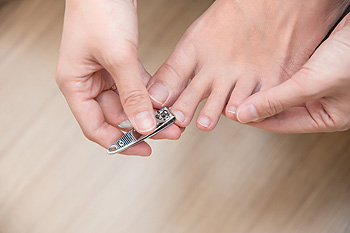How Do I Prevent Ingrown Toenails?
 Ingrown toenails can have a variety of different causes. The most common cause is said to be improper trimming of the nails. When you trim your toenails, you should use toenail clippers and trim your nails straight across. Avoid rounding the edges or cutting the nails too short. Another potential cause of ingrown nails is wearing shoes or socks that are too tight. Avoid tight-fitting shoes and socks and opt for looser options instead. Certain medical conditions can also lead to ingrown toenails. Hyperhidrosis, also known as excessive sweating of the feet, trauma to the nail from injury, or poor foot hygiene may all potentially lead to ingrown toenails. If you find yourself prone to ingrown nails, visit a podiatrist. A podiatrist can help determine the cause of your problem, treat the affected nails, and provide guidance on how to prevent ingrown toenails in the future.
Ingrown toenails can have a variety of different causes. The most common cause is said to be improper trimming of the nails. When you trim your toenails, you should use toenail clippers and trim your nails straight across. Avoid rounding the edges or cutting the nails too short. Another potential cause of ingrown nails is wearing shoes or socks that are too tight. Avoid tight-fitting shoes and socks and opt for looser options instead. Certain medical conditions can also lead to ingrown toenails. Hyperhidrosis, also known as excessive sweating of the feet, trauma to the nail from injury, or poor foot hygiene may all potentially lead to ingrown toenails. If you find yourself prone to ingrown nails, visit a podiatrist. A podiatrist can help determine the cause of your problem, treat the affected nails, and provide guidance on how to prevent ingrown toenails in the future.
Ingrown toenails can become painful if they are not treated properly. For more information about ingrown toenails, contact Anthony Ricciardi Jr., DPM of Foot & Ankle Specialists of Nevada. Our Doctor can provide the care you need to keep you pain-free and on your feet.
Ingrown Toenails
Ingrown toenails occur when a toenail grows sideways into the bed of the nail, causing pain, swelling, and possibly infection.
Causes
- Bacterial infections
- Improper nail cutting such as cutting it too short or not straight across
- Trauma to the toe, such as stubbing, which causes the nail to grow back irregularly
- Ill-fitting shoes that bunch the toes too close together
- Genetic predisposition
Prevention
Because ingrown toenails are not something found outside of shoe-wearing cultures, going barefoot as often as possible will decrease the likeliness of developing ingrown toenails. Wearing proper fitting shoes and using proper cutting techniques will also help decrease your risk of developing ingrown toenails.
Treatment
Ingrown toenails are a very treatable foot condition. In minor cases, soaking the affected area in salt or antibacterial soaps will not only help with the ingrown nail itself, but also help prevent any infections from occurring. In more severe cases, surgery is an option. In either case, speaking to your podiatrist about this condition will help you get a better understanding of specific treatment options that are right for you.
If you have any questions please feel free to contact our office located in Las Vegas, Nevada . We offer the newest diagnostic and treatment technologies for all your foot and ankle needs.
